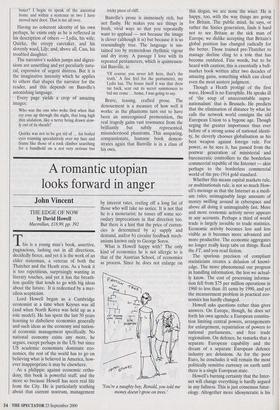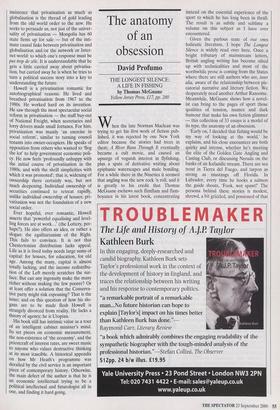A romantic utopian looks forward in anger
John Vincent
THE EDGE OF NOW by David Howell Macmillan, £18.99, pp. 392 This is a young man's book, assertive, pugnacious, lashing out in all directions, decidedly fierce, and yet it is the work of an elder statesman, a veteran of both the Thatcher and the Heath eras. As a book it is too repetitious, surprisingly wanting in literary touches, and yet it has the breath- less quality that tends to go with big ideas about the future. It is redeemed by a mer- ciless scepticism.
Lord Howell began as a Cambridge economist at a time when Keynes was all (and when North Korea was held up as a role model). He has spent the last 50 years learning to disbelieve economics generally and such ideas as the economy and nation- al economic management specifically. No national economy exists any more, he argues, except perhaps in the US: but since US academic economists dominate eco- nomics, the rest of the world has to go on believing what is believed in America, how- ever inappropriate it may be elsewhere.
As a philippic against economic ortho- doxy, this book is powerful stuff, and the more so because Howell has seen real life from the City. He is particularly scathing about that current nostrum, management by interest rates, reeling off a long list of those who will take no notice. It is not that he is a monetarist; he tosses off some sec- ondary imprecations in that direction too. But there is a hint that the price of curren- cies is determined by a) supply and demand, and/or b) circular feedback mech- anisms known only to George Soros. • What is Howell happy with? The only kind of economics he is not allergic to is that of the Austrian School, of economics as process. Since he does not enlarge on `You're a naughty boy, Ronald, you told me money doesn't grow on trees.' this slogan, we are none the wiser. He is happy, too, with the way things are going for Britain. The public mind, he says, or rather the Sixties generation, finds it hard not to see Britain as the sick man of Europe; we dislike accepting that Britain's global position has changed radically for the better. Those trained pre-Thatcher to manage decline cling to a role that has become outdated. Fine words, but to be heard with caution; this is essentially a bull- market book written after two decades of amazing gains, something which can cloud even the most austere judgment.
Though a Heath prot6g6 of the first wave, Howell is no Europhile. He speaks ill of 'the soup of unaccountable supra- nationalism' that is Brussels. He predicts that the elimination of distance by what he calls the network world consigns the old European Union to a bygone age. Though urging the greater importance than ever before of a strong sense of national identi- ty, he cleverly chooses globalisation as his best weapon against foreign rule. For power, as he sees it, has passed from the postwar generation of ministerial and bureaucratic controllers to the borderless commercial republic of the Internet — akin perhaps to the borderless commercial world of the pre-1914 gold standard.
Whether this means capital markets rule, or multinationals rule, is not so much How- ell's message as that the Internet as a medi- um rules; unimaginably large amounts of money swilling around in cyberspace and above all doing it unimaginably fast. More and more economic activity never appears in any accounts. Perhaps a third of world trade is largely invisible to trade statistics. Economic activity becomes less and less visible as it becomes more advanced and more productive. The economic aggregates no longer really keep tabs on things. Read the FT, and you read fiction.
The spurious precision of compliant statisticians creates a delusion of knowl- edge. The more phenomenal our progress in handling information, the less we actual- ly know. The cost of processing informa- tion fell from $75 per million operations in 1960 to less than .01 cents by 1990, and yet the measurement problem in practical eco- nomics has hardly changed.
Howell asks questions rather than gives answers. On Europe, though, he does set forth his own agenda: a European constitu- tion limiting central powers, arrangements for enlargement, repatriation of powers to national parliaments, and free trade regionalism. On defence, he remarks that a separate European capability and the dream of a separate European defence industry are delusions. As for the poor Euro, he concludes it will remain the most politically sensitive currency on earth until there is a single European state.
Howell's burning certainty that the Inter- net will change everything is hardly argued in any fullness. This is just consensus futur- ology. Altogether more idiosyncratic is his insistence that privatisation as much as globalisation is the thread of gold leading from the old world order to the new. He seeks to persuade us, not just of the univer- sality of privatisation — Mongolia has 60 state firms up for sale — but of the inti- mate causal links between privatisation and globalisation and /or the network or Inter- net world: to which one's response must be pas trop de zele. It is understandable that he gets a little carried away about privatisa- tion, but carried away he is when he tries to turn a political success story into a key to understanding the future.
Howell is a privatisation romantic for autobiographical reasons. He lived and breathed privatisation from 1967 to the 1980s. He worked hard on its invention. He saw through the most spectacular social reform in privatisation — the staff buy-out of National Freight, when secretaries and lorry drivers made small fortunes. For him, privatisation was mainly 'an exercise in social reform', similar to turning council tenants into owner-occupiers. He speaks of opposition from others who wanted to 'flog the lot' to help government economic poli- cy. He now feels 'profoundly unhappy with the initial course of privatisation in the 1980s, and with the shrill simplicities with which it was promoted'; that is, widening of ownership there certainly was, but not much deepening. Individual ownership of securities continued to retreat rapidly, unlike individual ownership of houses; pri- vatisation was not the foundation of a new social order.
Ever hopeful, ever romantic, Howell asserts that 'powerful equalising and level- ling forces are at work...' (the Lottery, per- haps?). He also offers an idea, or rather a slogan: the egalitarianism of the Right. This fails to convince. It is not that Chestertonian distributism lacks appeal. Life as it is lived today needs large sums of capital: for houses, for education, for old age. Among the many, capital is almost totally lacking, and the income redistribu- tion of the Left merely scratches the sur- face. But can any ingenuity make the many richer without making the few poorer? Or at least offer a solution that the Conserva- tive party might risk espousing? That is the issue; and on this question of how his slo- gans are to be made flesh Howell is strangely divorced from reality. He lacks a theory of agency; he is Utopian.
His book still has intrinsic value as a tour of an intelligent cabinet minister's mind. Its set pieces on economic measurement, the non-existence of 'the economy', and the priestcraft of interest rates, are sweet music to anyone who values destructive thinking at its most irascible. A historical appendix on how Mr Heath's programme was derailed by the civil service is an important piece of contemporary history. Otherwise, the main defect of the author is that he is an economic intellectual trying to be a political intellectual and futurologist all in one, and finding it hard going.























































































 Previous page
Previous page